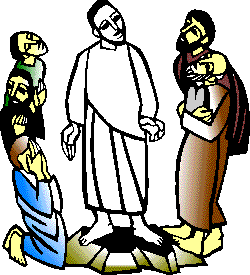
"Jesus transfigured with Moses and Elijah on one side, Peter, James and John on the other side."
Reprinted from Icon: Visual Images for Every Sunday, copywrite© 2000 Augsburg Fortress. Used by permission.

The three disciples were taken along as witnesses, and to strengthen them in view of what was said in verses 22 and 23. It was difficult for them to accept the suffering and death of Christ.
A MOUNTAIN - In Greek we have an article "the", possibly indicating Mt. Hermon, but we are not sure.
TO PRAY - The verb indicates purpose. His purpose was not that God should reveal Himself to Jesus, but indicates the incarnate Son of God who took our place. In view of His impending death, verse 22, perhaps His prayer was like that in the Garden of Gethsemane.
HIS FACE - They could see only that part of His body.
CHANGED - Means "different." The fact that His clothing became dazzling white means that His whole body (which they could not see) and human nature were visibly glorified.
AS A FLASH - It came from within not from the outside. Jesus was always true God but did not always visibly manifest it.
We might add "Suddenly, here is a remarkable thing, two men appeared, who were none other than Moses and Elijah."
Moses and Elijah represent the Law and the Prophets respectively.
APPEARED - They actually appeared. This is not a vision or a dream. Jesus' glory is inherent in His person. Their glory is a gift in the glorified state.
TALKING - Denotes the continued action of a formal discussion.
HIS DEPARTURE - The same as He spoke of in verse 22. Not a subtle allusion to the Exodus from Egypt.
ABOUT TO BRING - A preordained plan of God.
Note how prominent Peter is in the whole account. Whether or how much of the conversation they heard, we do not know. They woke up and saw Jesus glorified and Moses and Elijah in the state of glory.
THE MEN - Must mean Moses and Elijah.
What was good about being there? It must have been a remarkable experience. And the suggestion about the three tents likely means that Peter wanted this to continue. Furthermore, the announcement of Jesus' death, verse 22, must have staggered them. Perhaps Peter thought it would be better to stay there than to face Jesus' prediction. But, as the text says, he did not know what he was talking about. The remarkable thing is that he did not speak of tents for Peter, James, and John.
HE - Peter.
CLOUD - Is not an illusion to Exodus 24 and 34. Many modern exegetes practice diversionary eisagesis (putting into the text ideas that are not there), finding symbolism and allusions which are imagined, not part of the text.
THEM - Moses and Elijah.
At His baptism, Luke 3:22, the Father addressed Jesus. Here the Father addresses mankind. This man Jesus is the beloved and chosen Son of God. We are to listen only to the voice of this God-man, whether in joy or sorrow.
LISTEN - Means keep on listening.
The event came to a close, all that remained was Jesus, now no longer visibly glorified.
They were silent about this matter. In the Greek we have a double negative "they told nothing to no one." Later, of course, they did. Read what Peter says in 2 Peter 1:16-19. The prophetic Word is very sure. Peter did listen to Jesus. Read what John says in John 1:14 and John 20:31.
On this occasion the Father strengthened the Son to face the ordeal of suffering and death. He did so through the glorified Moses and Elijah. And He announces that He loves and has chosen this Son. On this occasion the Father strengthened the disciples who would soon have to face the suffering and death of their Master. On this occasion God announces to us that this man Jesus is truly God but will soon experience His exodus and He tells us to listen only to the voice of Jesus.
Higher critics, in their denial of the miraculous, have played havoc with this text. Some hold that it was originally an account of an appearance of the risen Christ. Some hold that the disciples merely had a dream in a half-hypnotic condition in which men see visions.
Arndt: We are here confronted with a great miracle, which we humbly accept as such.
D.F.Strauss, of course, regarded the story as a myth. Harnack believed it to rest on a vision that Peter experienced. Some people do not hesitate to put what is related here into the same class as epiphanies (appearances) of the pagans. The appearance of God related in Exodus 24 is likewise said possibly to have had some influence on the origin and development of this story. That those who deny the historicity of the account, which is found not only in the three Synoptic Gospel but also in 2 Peter 1:16-19, are guided not by the desire to set forth the content of Scripture, but by their own preconceived notions as to what can and cannot be true, is of course, very evident.